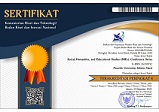Tolerance in A Plural Society: Revealing The Humility of The Sampetan Village Community
Abstract
The diversity of race, religion, ethnicity, art and culture in a nation is a potential for intolerance in the form of conflicts with nuances of diversity. In fact, diversity creates the value of local wisdom in the sense of diversity. The motto puts tolerance in a strategic domain. Incomplete understanding of religion and radical attitudes that are developing globally make tolerance difficult to materialize. Various studies on the development of a tolerance model have been carried out, but this model is only based on religious, educational, and cultural perspectives. Philosopische grondslag in this study is used to expose community harmony to solve problems of intolerance and radicalism. This study used a qualitative approach, beginning with collecting information from literature studies, collecting data using observation techniques, interviews, as well as documentation, reduction, presentation, and drawing conclusions or data verification. The objectives of this study are (a) to examine the praxis of tolerance based on the philosopische grondslag that has been applied in society, (b) to develop a tolerance model to prevent intolerance and religious deradicalization based on practice to increase peace in society. The results of the study found the values of the Pancasila philosopische grondslag as a habit adopted by a pluralistic society. The case study of the implementation of philosopische grondslag in Sampetan village Boyolali is manifested in the spirit of tolerance and working together to avoid anarchism and radicalism. All of these aspects are the basis for increasing order in society in general.
Keywords
Full Text:
PDFRefbacks
- There are currently no refbacks.





